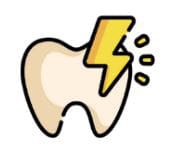
We all know how important it is to keep up with regular dental checkups, but what happens between visits? Sometimes, your mouth gives you subtle clues that something isn’t quite right. Recognizing the early signs of dental trouble can help you catch problems before they become painful—and expensive.
Whether you’re dealing with a minor issue or something more serious, early action is key to keeping your smile healthy and strong. So, what should you be on the lookout for?
Bleeding Gums
If you notice your gums bleeding when you brush or floss, don’t ignore it. While many people think this is normal, bleeding gums are often a sign of gingivitis—the earliest stage of gum disease.
In this stage, gums may also appear red, swollen, or tender. Left untreated, gingivitis can progress to periodontitis, a more serious condition that can lead to tooth loss.
What to do: Improve your brushing and flossing technique, and book a dental cleaning. Your dentist can remove plaque and tartar buildup and guide you on better oral hygiene.
Tooth Sensitivity
Do you feel a zing of pain when you sip a hot coffee or bite into something cold? Tooth sensitivity could mean your enamel is wearing down, or it could signal an issue like a cavity, receding gums, or even a cracked tooth.
What to do: Use a toothpaste for sensitive teeth and avoid extremely hot or cold foods. If sensitivity persists, make an appointment—it may need professional treatment.
Persistent Bad Breath
Everyone has bad breath occasionally, but chronic bad breath (also called halitosis) can be a warning sign of deeper issues like gum disease, tooth decay, or infection.
What to do: Step up your brushing and flossing routine, including brushing your tongue. If the issue continues, your dentist can check for underlying causes.
Tooth Discoloration or Dark Spots
Small dark spots on your teeth, especially in the grooves or between teeth, might be an early sign of a cavity. Discoloration can also indicate enamel erosion or staining from food and drinks.
What to do: Don’t wait for the pain. A quick filling or fluoride treatment can often stop decay before it gets worse.
Mouth Sores That Don’t Heal
A sore, bump, or patch in your mouth that lingers for more than two weeks could be more than just a canker sore. It might be a sign of infection, irritation, or in rare cases, oral cancer.
What to do: Any sore that doesn’t heal on its own should be checked by a dentist, especially if it’s painful, bleeds, or changes in size.
Dry Mouth
Saliva helps wash away bacteria and food particles. If your mouth is constantly dry, it can increase your risk of cavities and gum disease. Dry mouth can be caused by certain medications, dehydration, or underlying health conditions.
What to do: Stay hydrated, chew sugar-free gum, and talk to your dentist if the dryness persists. They may recommend saliva substitutes or further testing.
Jaw Pain or Clicking
Jaw discomfort, clicking, or popping when you open and close your mouth could indicate TMJ (temporomandibular joint) disorder. It might be linked to teeth grinding, stress, or bite alignment issues.
What to do: Mention it at your next dental visit. Your dentist can assess your bite and may recommend a night guard or other treatment.
Your Mouth is Full of Helpful Signals—if you’re paying attention.
While it’s easy to brush off small issues, they can often be early signs of something bigger. By recognizing these warning signs early, you can get the care you need before a minor concern turns into a major dental problem.
When in doubt, call us! Trust your instincts—your smile is worth it!
